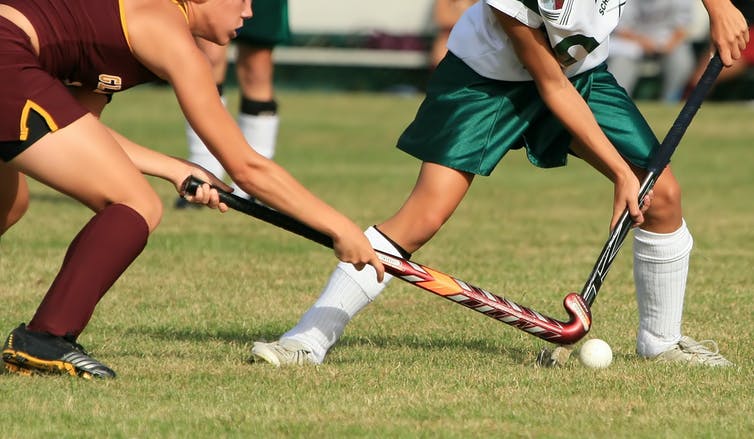

Shutterstock/Racheal Grazias
First XV secondary school rugby in New Zealand has been televised for some time on Sky Sport. The attraction of new revenue for broadcasters and other sporting organisations is clear, but what might the cost be for young athletes?
The new broadcast deal is a collaboration between the New Zealand Sport Collective (created by former Olympic rowing champion Rob Waddell and representing more than 50 sports) and Sky Sport Next, a YouTube channel run by Sky TV.
The deal evolved after consultation with several bodies including the New Zealand Secondary School Sports Council (NZSSSC), which coordinates secondary school sport.
It is easy to understand why some school students would like to be on television. But there are moral and ethical issues that need to be considered by those charged with governing school sport.
Some principals claim the partnership was not discussed with them in advance.
The increased television exposure adds to concerns of an overly professionalised, “win at all costs” culture that already exists in some school sport.
In response to these concerns, the NZSSSC set up a broadcasting charter in an attempt to protect the health and well-being of students and allow those who do not want to be televised to opt out.
But in reality, the power imbalances at play and other influences mean the charter is unlikely to be effective in many situations. For example, rather than opting out, some schools may feel pressure on them to stay in, to please players and parents.
Adult high-performance sport must constantly balance health and performance, but secondary school sport must prioritise health.
Evidence suggests professional, high-performance athletes are at increased risk of a “high athlete identity”. This is the degree to which someone defines themself based on their athletic role, and looks to others for confirmation based on that role. This can have both positive and negative consequences.
A performance culture in school sport increases the likelihood of students developing a high athlete identity and this has been linked to dropout from sport.
Given only a very small number of students will become professional athletes (possibly less than 2%) the potentially negative consequences on mental health are a major concern.
Research in adults and US college athletes shows greater difficulty adjusting to a lack of sporting success and more frequent psychological issues in people with higher levels of athletic identity.
A recent secondary school rugby study in New Zealand found high performance expectations often led to a fear of failure. The expected commitment was too much alongside academic workloads.
On the physical side, there is real concern about attitudes to injury. The under-reporting of concussion in rugby is associated with the perceived importance of a match. More than 50% of players across multiple secondary school sports say they’ve seen a player play on when they thought they were concussed.
Beyond concussion, 80% of secondary school netball and football players say they have played while injured, and 50% report being pressured to do so. Increased intensity, driven by a performance culture, has also contributed to increased injuries at even earlier ages in intermediate school sport (ages 12 and 13).
Recent data from the Accident Compensation Corporation (ACC) and Netball NZ reveal a rise in injuries in the 10–14 age group over the past ten years.
In response to concerns, Sport New Zealand recently launched its Balance is Better initiative, which promotes an evidence-based, developmental approach to youth sport.
This philosophy does not seem to align with increased television exposure for school sport. It led to questions being asked about the mixed messages emanating from our government agency and their lack of leadership on this issue.
In New Zealand we appear to be at a crossroads in relation to youth sport. As researchers concerned about some of the costs associated with the increasing professionalisation of youth sport, the Balance is Better philosophy suggests we were moving in the right direction.
But increased exposure on television risks extending the high-performance culture in which success is measured solely by the scoreboard. This is increasingly irreconcilable with a culture in which healthy competition contributes to positive youth development.
At a time when the current culture of youth sport is a concern in many countries, is validating participation through the televising of youth sport the direction we want to go?
School sport should be an inclusive form of physical activity. It should be strategically aligned with health and developmental benefits for all students. It should engage as many students as possible, for as long as possible.
A performance-driven culture in school sport, fuelled by television exposure, promotes an inefficient and ineffective way to identify and develop talent. There is little evidence success in school sport predicts future adult sporting success.
The priority for schools should be to develop healthy, high-performing people, not high-performing athletes. School sport can (and should) be a highlight in the educational experience of youth, potentially enhancing physical, social and cultural development.
A new parent portal from the Ministry of Education aimed at engaging parents and whānau…
The announcement of $53 million to cover teachers’ registration and practising certificate fees has been…
Applications for charter school conversion appear to have dried up after strong interest from the…
Will watching the Netflix drama Adolescence help us have hard conversations with young boys and…
Many students lack basic practical life skills like budgeting, letter writing, and preparing for a…
Educators and politicians are trying to address the current teaching shortage through different policy settings.…
This website uses cookies.